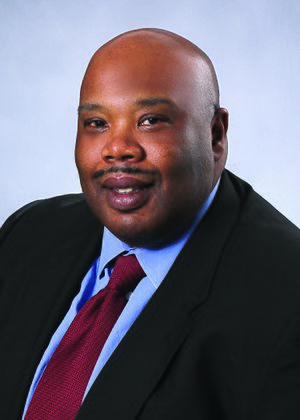Squire Booker facts for kids
Squire Booker is an American scientist who studies biochemistry at Penn State University. Biochemistry is the study of the chemical processes that happen inside living things. Dr. Booker leads a research team that explores how enzymes work. Enzymes are special proteins that help speed up chemical reactions in our bodies.
He also helps edit a science journal called the American Chemical Society Biochemistry Journal. Dr. Booker is a respected researcher and a leader in science at Penn State University.
Contents
Early Life and Education
Squire Booker was born on September 9, 1965. He grew up in Beaumont, Texas. He was raised by his grandmother and three uncles.
His College Journey
Dr. Booker went to Austin College and earned a degree in chemistry in 1987. After that, he studied biochemistry at Massachusetts Institute of Technology (MIT). He received his Ph.D. in 1994.
He then did more research in Paris, France, and at the University of Wisconsin. In 1999, he became a professor at Penn State University. He became a full professor there in 2005.
Amazing Science Research
Dr. Booker is a professor of biology, biochemistry, and molecular biology at Penn State University. His research looks at how enzymes change their abilities because of tiny metal parts.
How Enzymes Work
His main focus is on enzymes that have iron-sulfur clusters. These are like tiny machines inside the enzymes that help them do important chemical reactions. He studies a group of enzymes called the Radical S-adenosylamethionine Superfamily (SAM). These enzymes are involved in changing DNA and proteins.
Fighting Superbugs
Dr. Booker also studies bacteria like Staphylococcus aureus. This bacterium is often found on human skin and in the nose. It can be a problem because it can turn into a "superbug" called MRSA. Superbugs are bacteria that are hard to kill with regular antibiotics.
Understanding Antibiotic Resistance
He found that S. aureus makes a protein called Cfr. This protein helps the bacteria resist many antibiotics. It does this by changing the bacteria's ribosomes, which are like tiny factories that make proteins. Many antibiotics work by stopping these ribosomes. But when Cfr is present, it protects the ribosomes, allowing the bacteria to survive.
Dr. Booker's lab also studies another bacterium called Escherichia coli. He figured out the 3D shape of a protein called RImN from this bacteria. Understanding this shape helps scientists learn more about how bacteria become resistant to antibiotics. His research aims to create new medicines that can stop these bacteria's defenses. This would make antibiotics work better against tough infections.
Promoting Diversity in Science
Dr. Booker is very active in helping more people get involved in Science, Technology, Engineering, and Mathematics (STEM). He especially supports college students and those studying for advanced degrees.
He helped organize a workshop in 2010. This workshop talked about the challenges that minority scientists face. It also discussed how to get funding for their research.
In 2019, Dr. Booker gave a speech at MIT. He was chosen because of his important scientific work and his efforts to make STEM more welcoming for everyone. In his speech, he told graduates to use their knowledge to help society. He encouraged them to support each other, no matter their background.
Awards and Honors
Dr. Booker has received many awards for his important work:
- 2022 Hans Neurath Award from the Protein Society
- 2019 Associate Editor for the American Chemical Society Biochemistry Journal
- 2018 Evan Pugh Professor at Penn State University
- 2017 Eberly Distinguished Chair in Science at Penn State University
- 2017 Elected to the American Academy of Arts and Sciences
- 2017 Lloyd N. Ferguson Distinguished Lecturer at Cal State, Los Angeles
- 2016 Penn State Faculty Scholar Medal
- 2016 Scott Lectureship in Chemistry and Biochemistry at the University of Florida
- 2016 Co-organizer of the ASBMB Annual Meeting
- 2015 Selected as a Hughes Medical Investigator
- 2015 Everson Lectureship in Biochemistry at the University of Wisconsin, Madison
- 2014 Fellow of the American Association for the Advancement of Science
- 2013 TY Shen Lectureship in Biological Chemistry at MIT
- 2011 American Chemical Society Arthur C. Cope Scholar Award
- 2006 co-chair, GRC on Enzyme Coenzymes and Metabolic Pathways
- 2004 Presidential Early Career Award in Science and Engineering
- 2002-2007 NSF Faculty Early Career Award
- 1996-1999 NIH Postdoctoral Fellow at the Institute for Enzyme Research at the University of Wisconsin
- 1994-1995 NSF-NATO Postdoctoral Fellow
Images for kids



